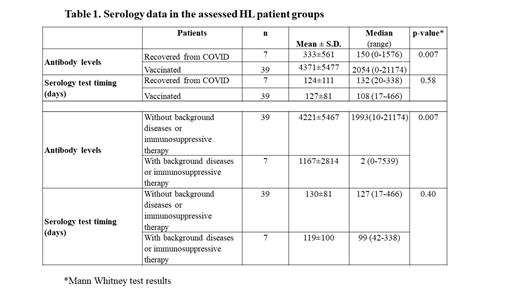Abstract
Introduction: In patients with hematological malignancies, COVID-19 is considered to be associated with a high risk of severe morbidity and mortality. While anti-COVID-19 vaccination of such patients has become the standard of care, many of them fail to generate protective serological response due to either the nature of their underlying disease or exposure to therapy. Surprisingly, none of the Hodgkin lymphoma (HL) patients treated or followed at our tertiary care center, has been hospitalized for severe COVID-19. Nevertheless, the vulnerability of this patient population to infections highlights the need for efficacious protection against this life-threatening disease. The current non-interventional single-center study has aimed to evaluate the serological response in HL patients vaccinated against the virus in comparison to those HL patients who had a history of COVID-19 infection. The impact of an additional background disease or use of lymphodepleting agents on the evaluated serological response of HL patients has also been assessed.
Methods: The BNT162b2 vaccine (Pfizer) was available in Israel from January 2021 and all costs were covered by the National Health Service. Thus, all patients with hematological malignancies were recommended to undergo vaccination with 2 doses of this vaccine, injected 21 days apart. The serology test was performed at least two weeks after the second vaccination. The SARS-CoV-2 IgG II Quant (Abbott©) assay was used to measure the levels of IgG antibodies against the SARS-CoV-2 spike protein. The result was considered positive if the IgG level was ≥50 AU/ml, which was defined as an adequate serological response.
Results: Fifty-two HL patients were offered to have their serological response evaluated. Six declined. Sixteen patients had early-stage HL, stage I-II, and 30 had advanced disease, including 4 patients with stage IIB bulky, 9 - with stage III and 17 - with stage IV disease. Study participants received 1-9 lines of therapy (median 1 line). Twelve patients were being treated for active disease when their serology was tested. The study was approved by the Institutional Review Board (Approval #0883-20-RMB) and patients signed informed consent. Ten patients were diagnosed with COVID-19, with none of them being hospitalized. Forty-two other patients received two vaccine doses. One patient who had been diagnosed with COVID-19 and was later vaccinated with a single dose was analyzed with vaccinated patients. Serology tests were performed at a median of 132 days from COVID-19 diagnosis or 108 days from vaccination, with no statistical difference in test timing between the groups. Similarly, the median age did not differ between the groups [41 (28-64) and 43 (18-80) years, respectively; p=0.98]. Data on antibody levels were available for 7/10 patients who recovered from COVID-19, with a median antibody level equating to 113 (0-1576) AU/ml (Table 1). In the group of 39 vaccinated patients, the median antibody level was 2054 AU/ml (0-21174; p=0.007).
An additional analysis was performed to compare the evaluated parameters in a subgroup of patients (n=7) who had another background disease along with HL, such as chronic lymphocytic leukemia, s/p kidney transplantation, solid tumor, or those who were heavily pretreated, including therapy with bendamustine, versus the values observed in the rest of the patients (n=39). The median age in the above subgroup was found to be 60 (38-80) years, which was significantly older than in the remaining patients [median age 41 (18-78) years; p=0.029)]. Likewise, median IgG antibody levels demonstrated significant difference between these two subgroups, equating to 2 (0-7539) AU/ml and 1993 (0-21174) AU/ml, respectively (p=0.007). Of the 36 vaccinated HL patients with no background disease 92% had adequate anti-spike antibody levels at a median of 100 days post-vaccination.
Conclusions: The results of the current study suggest that at least 87% of Hodgkin lymphoma patients develop a high titer of anti-spike antibodies after vaccination with two doses of BNT162b2. Among HL patients, the antibody titer levels in vaccinated individuals are found to be 18-fold higher than in those who have recovered from COVID-19. Only a minority of HL patients who had additional background diseases or were heavily pretreated, failed to develop an adequate serological response.
No relevant conflicts of interest to declare.


This feature is available to Subscribers Only
Sign In or Create an Account Close Modal